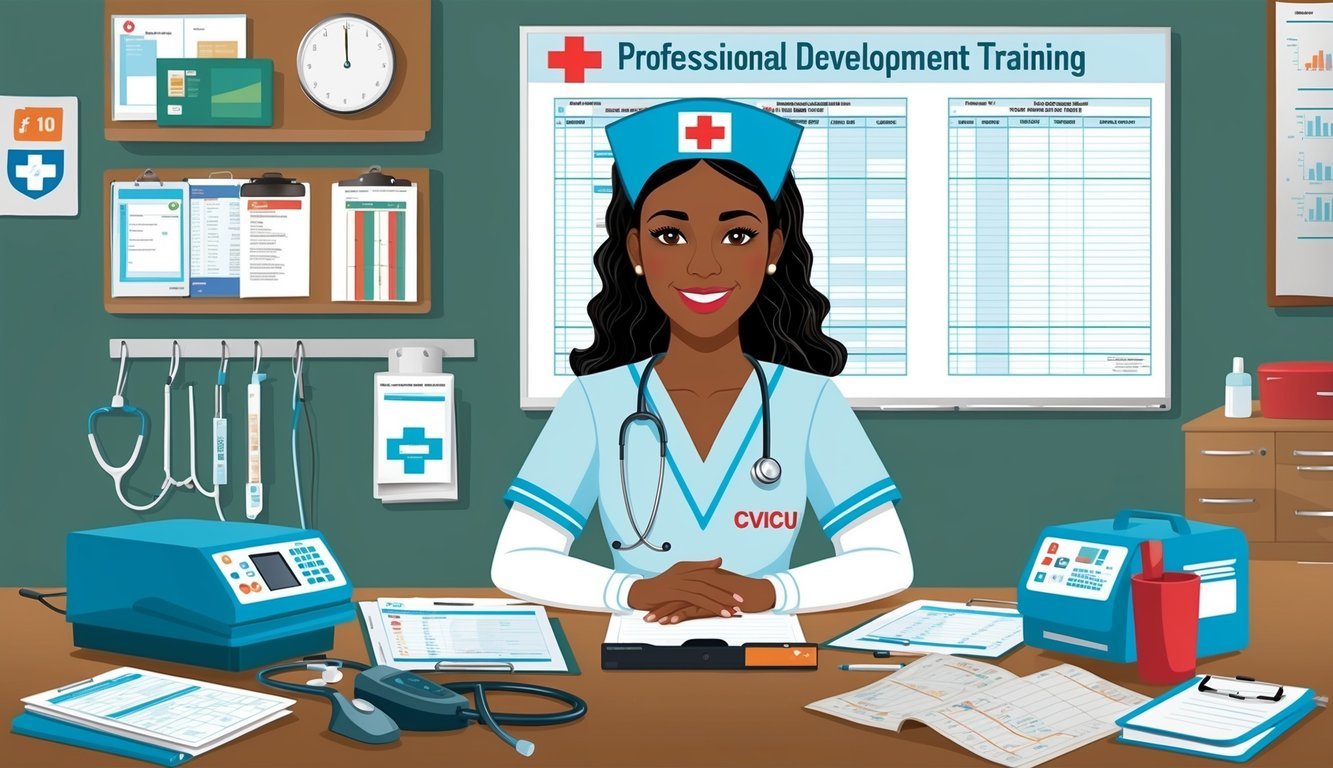As a CVICU nurse, you play a vital role in the care of critically ill patients dealing with heart and vascular issues.
These specialized nurses work within the Cardiovascular Intensive Care Unit, where they use advanced skills to monitor and support patients undergoing serious medical challenges.
You will encounter a dynamic and demanding environment where quick thinking and deep clinical knowledge are essential.
In this specialty, your responsibilities range from administering medications to collaborating with a healthcare team, ensuring patients receive the best care possible.
The path to becoming a CVICU nurse involves specific education and certification, which can significantly enhance your career opportunities and earning potential.
Understanding the complexities of critical care nursing is crucial to thriving in this profession.
Key Takeaways
- CVICU nurses provide specialized care for critically ill patients with heart conditions.
- Proper education and certification are essential for success in this challenging field.
- The role offers opportunities for career growth and increased compensation.
Education and Certification

To become a CVICU nurse, you must meet specific educational requirements and obtain the necessary certifications.
This involves completing a nursing degree, obtaining licensure, and possibly pursuing specialized certifications to enhance your skills and job prospects.
Academic Requirements
To start your journey, you need to earn a nursing degree.
The most common routes are:
- Bachelor of Science in Nursing (BSN): This four-year program is preferred by most employers.
- Associate Degree in Nursing (ADN): Some employers accept this two-year degree, but advancements in the field often favor BSN holders.
During your studies, you will cover essential topics like anatomy, pharmacology, and nursing ethics.
After earning your degree, you need to gain clinical experience, particularly in critical care units, to prepare for a CVICU role.
Licensure and Examinations
After completing your degree, you must obtain your registered nurse (RN) license.
This involves passing the NCLEX-RN exam, which tests your nursing knowledge and skills.
Once you pass, you will be licensed to practice as a registered nurse.
Many employers also require certification in Basic Life Support (BLS) for working in critical care settings.
Keeping your skills current through ongoing training and education is essential for career advancement and patient safety.
Specialized Certifications
In addition to your RN license, you can pursue specialized certifications that enhance your qualifications.
One important option is the CVICU Nurse Certification.
This certification demonstrates your expertise in caring for patients with cardiac issues.
To qualify for the CVICU certification, you typically need:
- A valid RN license
- Relevant nursing experience in a critical care setting
- Completion of necessary continuing education
Specialized certifications can help you stand out in the job market and may lead to higher earning potential and advanced roles within the ICU setting.
For more information about certification options, you can explore resources from the American Association of Critical-Care Nurses and other professional nursing organizations.
Roles and Responsibilities
As a CVICU nurse, you play a critical role in caring for patients with severe heart and vascular conditions.
Your responsibilities include clinical duties, patient care, and collaborating with other healthcare professionals to ensure optimal outcomes.
Clinical Duties
Your primary clinical responsibilities involve monitoring vital signs and performing cardiac assessments.
You will frequently check blood pressure, heart rate, and oxygen levels, ensuring timely interventions if any abnormalities arise.
Skills in cardiac monitoring are essential.
You will use specialized equipment to track heart rhythms and detect potential problems.
In addition, you’ll be responsible for administering medications and IV fluids, requiring attention to detail and knowledge of drug interactions.
Your role also includes performing CPR when necessary, ensuring you’re prepared for emergency situations.
Regular training in advanced cardiac life support (ACLS) is crucial for these duties.
Patient Care
Providing comprehensive patient care is a significant part of your role.
You must assess each patient’s condition, noting any changes and reporting them to the physician.
Your ability to communicate effectively is vital as you explain procedures and treatment plans to patients and their families.
This helps alleviate anxiety and fosters a trusting relationship.
You also need strong nursing skills, such as wound care and patient hygiene.
Helping patients maintain comfort and dignity is crucial, especially in a critical care setting.
Interdisciplinary Collaboration
Collaboration with other healthcare professionals is essential for effective patient management.
You will regularly communicate with doctors, respiratory therapists, pharmacists, and other nurses.
Working as part of a team allows for comprehensive patient assessments and ensures everyone is informed about care plans.
Your critical thinking skills help you contribute valuable insights during team discussions, improving patient outcomes.
Participating in daily rounds with the care team can enhance your understanding of each patient’s needs and adjust care strategies accordingly.
Building strong professional relationships is key to delivering high-quality care in a CVICU setting.
Clinical Knowledge and Skills

As a CVICU nurse, you need a strong foundation in cardiovascular conditions and the ability to perform advanced clinical procedures.
Understanding these aspects is critical for providing the best patient care.
Cardiovascular Conditions and Treatments
In the CVICU, you frequently encounter serious conditions like heart attacks, heart failure, and congestive heart failure.
It’s essential to recognize the signs and symptoms of these issues quickly.
Common treatments include:
- Coronary Artery Bypass Graft (CABG): This surgery reroutes blood around blocked arteries.
- Intra-aortic Balloon Pump (IABP): This device helps the heart pump more effectively during severe heart problems.
- Extracorporeal Membrane Oxygenation (ECMO): A life-support technique that pumps and oxygenates blood outside the body.
Familiarity with these conditions and treatments enhances your capability to respond effectively in emergencies.
Advanced Clinical Procedures
You are required to perform various advanced clinical procedures.
Skills in managing devices like Impella and IABP are essential.
Key procedures include:
- Monitoring equipment: Understand how to interpret data from heart monitors and ventilators.
- Wound care: Knowledge of proper techniques for caring for surgical incisions is vital, especially after cardiovascular surgeries.
- Medication administration: You must be proficient in administering IV medications to manage pain, sedation, and hemodynamic stability.
By mastering these skills, you ensure rapid responses to any changes in patients’ conditions.
Professional Development

In the field of CVICU nursing, professional development is essential for advancing your career and ensuring high-quality patient care.
This involves pursuing career pathways and engaging in continuing education to stay updated on critical practices.
Career Pathways
As a CVICU nurse, you have several career pathways to consider.
These options can help you specialize and advance your skills.
-
CCRN Certification: Becoming a Critical Care Registered Nurse (CCRN) validates your expertise in critical care. This certification demonstrates your understanding of high-acuity patients, which enhances your credibility.
-
Advanced Certifications: Consider obtaining certifications like Advanced Cardiac Life Support (ACLS) and Pediatric Advanced Life Support (PALS). These skills are vital in managing emergencies in a cardiovascular context.
-
Travel Nursing: Exploring travel nurse positions can expand your experience and allow you to work in various healthcare settings. This can offer you unique insights and enhance your adaptability.
Continuing Education
Engaging in continuing education is vital for maintaining and expanding your knowledge.
Here are some avenues to explore:
-
Formal Degrees: Consider pursuing a bachelor’s or master’s degree specializing in nursing to deepen your expertise and open up leadership roles.
-
Workshops and Seminars: Attend workshops on topics like advanced cardiovascular techniques or patient care improvements. These sessions often provide hands-on experience and networking opportunities.
-
Online Courses: Platforms like Medscape and NursingCE offer courses that keep your skills sharp and can lead to additional certifications.
Continuing education not only enhances your skills but also prepares you for advancements in technology and patient care practices.
Compensation and Opportunities

CVICU nurses play a critical role in caring for patients with heart conditions.
Understanding their compensation and the opportunities available can help you make informed career choices in this field.
Salary Overview
The average salary for a CVICU nurse varies based on experience, location, and the healthcare facility.
As of October 2024, the average annual pay is approximately $77,042.
Salaries can range widely, from around $57,296 to as much as $98,509.
Some factors that influence salary include:
| Factor | Impact on Salary |
|---|---|
| Experience | More experience leads to higher pay |
| Location | Urban areas often offer better compensation |
| Specialization | Advanced certifications can increase earnings |
For instance, CVICU travel nurses may earn more, with some reports showing $2,394 per week.
This could be especially relevant if you consider taking travel nursing roles.
Employment Settings
CVICU nurses typically work in various healthcare settings, including:
- Hospitals: Most commonly found in cardiovascular units.
- Specialty Clinics: Focus on heart care and related procedures.
- Rehabilitation Centers: Assist patients recovering from heart surgeries, such as heart transplants.
These environments require a high level of expertise and specialized training.
Working in a CVICU is demanding, but offers rewarding experiences and a chance to make a significant difference in patients’ lives.
Job Market Trends
The job market for CVICU nurses is strong and expected to grow.
The increasing prevalence of heart disease drives demand for skilled nurses in this specialty.
As of recent data, the staffing needs in hospitals are particularly acute, reflecting a broader trend in healthcare.
Key points to consider:
- Growth Rate: The nursing profession, including CVICU specialties, is projected to grow faster than average in the coming years.
- Demand for Skills: Advanced skills in cardiac care can boost job opportunities.
- Geographic Variability: Some states may offer higher salaries and more openings than others, so it’s wise to research locations.
With the right qualifications and experience, you can find numerous rewarding positions in the CVICU field.
For further insights on salary trends and job opportunities, you might want to check platforms like Trusted Health or Vivian Health.
Frequently Asked Questions
This section addresses important questions regarding the CVICU nursing role.
You will find details about qualifications, certifications, salaries, responsibilities, career trajectories, and specialized training programs.
What qualifications are necessary to become a CVICU nurse?
To become a CVICU nurse, you typically need at least a Bachelor of Science in Nursing (BSN).
Some facilities may consider an Associate Degree in Nursing (ADN), but a BSN is more common.
You must also pass the NCLEX-RN exam to obtain your nursing license.
What type of certification is required for a CVICU nurse?
Many CVICU nurses pursue certification from the American Association of Critical-Care Nurses (AACN).
The Critical Care Registered Nurse (CCRN) certification is one option.
This credential shows your expertise in critical care nursing.
You may also consider specialized certifications based on your hospital’s requirements.
How does the salary of a CVICU nurse compare across different regions in the United States?
CVICU nurse salaries can vary significantly by location.
According to research, the average yearly salary typically ranges from $97,500 to $118,000.
In certain regions, especially those with higher costs of living, more experienced nurses can earn up to $143,000.
What are common responsibilities of nurses working in a Cardiovascular Intensive Care Unit?
Nurses in the CVICU care for patients with severe cardiac conditions.
You will monitor vital signs, administer medications, and manage complex medical equipment.
Patient care involves collaborating with a multidisciplinary team to develop and implement individualized treatment plans.
What is the typical career trajectory for a nurse in a CVICU setting?
A CVICU nurse can advance their career through various paths.
You might start as a staff nurse and then move to roles such as charge nurse or nurse manager.
Advanced practice roles, like Nurse Practitioner (NP) or Clinical Nurse Specialist (CNS), are also options with further education and certification.
Are there any specialized training programs for nurses aspiring to work in a CVICU?
Yes, many hospitals offer specialized training programs for new nurses in the CVICU.
These programs usually include structured orientation periods that last 9 to 12 weeks.
Some units may also provide mentorship and hands-on training focused on cardiac care practices.

